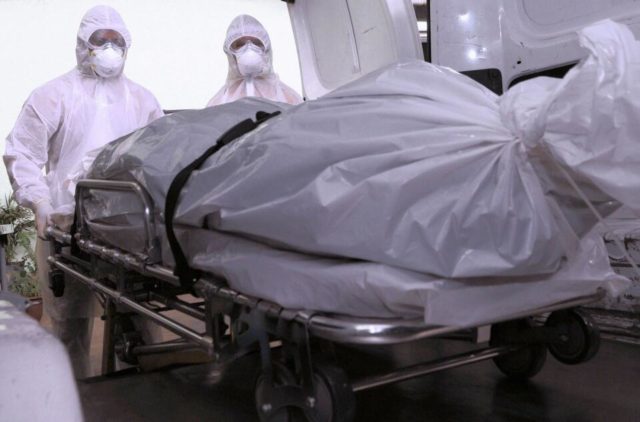Although there is no evidence that Covid-19 is transmitted from a corpse, undertakers here say they will rather err on the side of caution.
THE NORTHERN Cape Funeral Parlours Association has urged undertakers to continue to take the necessary precautionary measures to prevent the spread of Covid-19 by continuing to wrap corpses in plastic prior to burial.
The Department of Health’s ministerial advisory committee on Covid-19 has indicated that wrapping bodies and coffins in multiple layers of plastic contravened certain cultural beliefs and rituals and was “unnecessary”.
“Consequently some graves have been dug up, the bodies illegally exhumed and the plastic coverings removed and the coffin reburied without approval.”
The Northern Cape Funeral Parlours Association on Friday stated that there was still no conclusive evidence regarding how the virus was spread.
“Undertakers in the Province have not been briefed about the memorandum from the Department of Health yet. We still do not know for sure if the virus is airborne or if it is highly contagious. It is always better to take the necessary precautions. Funeral undertakers do not want to be blamed for spreading the disease. We need input from the health experts first.”
Co-chairpersons of the committee Professor Salim Abdool Karim and Professor Marian Jacobs pointed out that to date, there had not been any reported case of SARS-CoV2 transmission from a dead body to a human.
“Wrapping of the coffin with plastic or any other material is not required for infection control. Wrapping of the corpse with plastic is not required for infection control, as there is no evidence of transmission of Covid-19 from a corpse.”
They stated that there was “very little risk” of infection being transmitted from a body to those carefully handling the corpse.
“The possibility of the virus escaping during pressure applied to the chest soon after death might expel live virus but this has not been proven. When dealing with a corpse, all handlers must ensure that precautions are in place such as wearing appropriate personal protective equipment (PPE) which protects the body, respiratory tract and mucous membranes from accidental splash contamination.”
The committee pointed out the transmission at funerals occurred mainly due to overcrowding, lack of social distancing and wearing of masks, failure to use hand sanitiser and ensure good ventilation.
“The World Health Organization (WHO) recommends the use of body bags to transfer the corpse from the hospital bed to the mortuary or funeral parlour for preparation. This is to avoid exposure to body fluids. If there are no signs of fluid leak, a shroud is acceptable.”
It advised that any person handling a body, to abide by the rules of carefully handling the corpse, hand hygiene, wearing appropriate PPE, and cleaning/disinfection after the process is completed.
“No exhumation or reburial can be conducted without authorisation. All reburials should be conducted in terms of the regulations.”
The committee suggested that alternatives, such as a body bag, blanket or shroud be used to wrap a corpse for burial.
“The face may be exposed during the funeral proceedings, provided that it is not possible to touch or hug the face. To prevent touching the corpse, a Pperspex or similar cover over the exposed face should be used. All those handling the corpse should use appropriate PPE as they may have to handle infectious materials and surfaces.”
Secretary of the Moral Regeneration Movement in the Northern Cape Shaine Griqua welcomed the findings of the committee.
“There is much anger and frustration especially when the poor people had to be wrapped for ‘infection control’ while the coffin of Minister in the Presidency Jackson Mthembu was not wrapped. Many families were robbed of bidding their loved ones goodbye.”
He added that many of the regulations surrounding Covid-19 burials remained vague.
“The Namaqualand religious fraternity have regular meetings with the local district command council and those and more issues were discussed. We are not sure if any direction to religious leaders in the Frances Baard district regarding the latest developments.
“So we will have to educate the funeral parlour structures about the memorandum.
“The recommendations are clear. We should stop torturing our people if scientists cannot find any evidence of infection.”
Griqua stated that families had the added uncertainty of not knowing if they are burying the correct person.
“At many funerals the hearse just passes the house of the deceased where the corpse is not brought in for the service. This creates an added trauma on the bereaved family as they are denied an opportunity of viewing the body and saying a proper farewell.
“During the pandemic there is an increase in mental instability due to the lockdown, coupled with the fear of job losses and extreme poverty.”
Spokesperson for the Department of Health Lebogang Majaha added that the Province would follow the directives issued by the national department.








